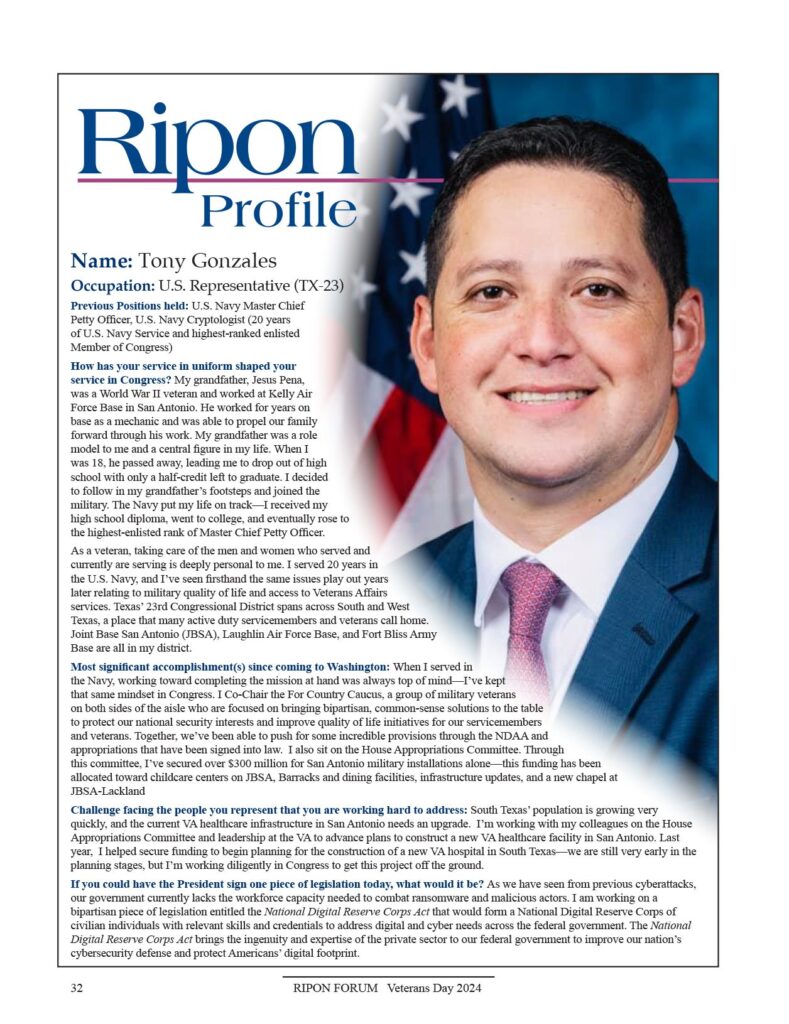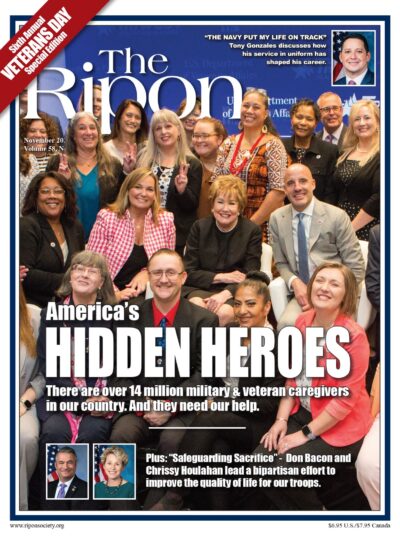
Name & occupation:
U.S. Representative Tony Gonzales (TX-23)
Previous Positions held:
U.S. Navy Master Chief Petty Officer, U.S. Navy Cryptologist
(20 years of U.S. Navy Service and highest-ranked enlisted Member of Congress)
How has your service in uniform shaped your service in Congress?
My grandfather, Jesus Pena, was a World War II veteran and worked at Kelly Air Force Base in San Antonio. He worked for years on base as a mechanic and was able to propel our family forward through his work. My grandfather was a role model to me and a central figure in my life. When I was 18, he passed away, leading me to drop out of high school with only a half-credit left to graduate. I decided to follow in my grandfather’s footsteps and joined the military. The Navy put my life on track—I received my high school diploma, went to college, and eventually rose to the highest-enlisted rank of Master Chief Petty Officer.
As a veteran, taking care of the men and women who served and currently are serving is deeply personal to me. I served 20 years in the U.S. Navy, and I’ve seen firsthand the same issues play out years later relating to military quality of life and access to Veterans Affairs services. Texas’ 23rd Congressional District spans across South and West Texas, a place that many active duty servicemembers and veterans call home. Joint Base San Antonio (JBSA), Laughlin Air Force Base, and Fort Bliss Army Base are all in my district. I’ve been fortunate to build personal relationships with leaders across these bases and the military service branches—it has made a huge difference in the way we’re able to solve problems and deliver for our veterans, servicemembers, and military families across South and West Texas.
In our office, we employ veterans to work on military, veterans, and national security-related legislative priorities, casework, and outreach. I’m incredibly proud to employ several veterans who work alongside me to drive our mission forward. It makes a difference when a servicemember or veteran is talking to someone who knows the issue inside and out because they have lived it. When it comes to these matters, there are some things you can’t learn in a book—you must experience it.
Most significant accomplishment(s) since coming to Washington:
When I served in the Navy, working toward completing the mission at hand was always top of mind—I’ve kept that same mindset in Congress. I Co-Chair the For Country Caucus, in Congress—we’re a group of military veterans on both sides of the aisle who are focused on bringing bipartisan, common-sense solutions to the table to protect our national security interests and improve quality of life initiatives for our servicemembers and veterans. Together, we’ve been able to push for some incredible provisions through the NDAA and appropriations that have been signed into law.
I also sit on the House Appropriations Committee. Through this committee, I’ve secured over $300 million for San Antonio military installations alone—this funding has been allocated toward childcare centers on JBSA, Barracks and dining facilities, infrastructure updates, and a new chapel at JBSA-Lackland. Additionally, my provision to raise the Family Separation Allowance (FSA) from $250 to $400 was included in the FY24 NDAA that was signed into law in December of 2023. This additional compensation benefit helps servicemembers and their families with the added costs that stem from living in separate locations due to their military assignments.
I hosted the Department of Veterans Affairs (VA) Secretary Denis McDonough in San Antonio. Together, we visited VA-affiliated facilities and heard directly from South Texas veterans. A large focus of our conversation centered around ensuring veterans exposed to burn pits, Agent Orange, and other toxic substances had the tools necessary to apply for VA benefits funded by the PACT Act. I proudly supported this legislation in Congress. In 2022, I partnered with VA Secretary McDonough as well to get the ball rolling on funding for a new VA facility in El Paso. Through the appropriations process, we were able to secure $700 million to make the facility a reality. This summer, I attended the groundbreaking ceremony for the new facility that will be housed on Fort Bliss. Those who sacrificed on and off the battlefield have earned their benefits—I’ll never stray in my commitment to improving access to healthcare and VA facilities for our veterans.
Challenge facing the people you represent that you are working hard to address:
South Texas’ population is growing very quickly, and the current VA healthcare infrastructure in San Antonio needs an upgrade. I’m working with my colleagues on the House Appropriations Committee and leadership at the VA to advance plans to construct a new VA healthcare facility in San Antonio. Last year, I helped secure funding to begin planning for the construction of a new VA hospital in South Texas—we are still very early in the planning stages, but I’m working diligently in Congress to get this project off the ground.
If you could have the President sign one piece of legislation today, what would it be?
As we have seen from previous cyberattacks, our government currently lacks the workforce capacity needed to combat ransomware and malicious actors. If an attack toward our VA or any military-affiliated databases were to take place, it could cause severe repercussions in delivering quality care to our veterans, exploit sensitive information, and cause an absolute national security disaster.
That’s why I am working on a bipartisan piece of legislation entitled the National Digital Reserve Corps Act that would form a National Digital Reserve Corps of civilian individuals with relevant skills and credentials to address digital and cyber needs across the federal government. These reservists would also have the opportunity to obtain and maintain security clearances, complete certifications, and receive training and education to better equip them to meet the federal government’s cybersecurity and digital needs. The National Digital Reserve Corps Act brings the ingenuity and expertise of the private sector to our federal government to improve our nation’s cybersecurity defense and protect Americans’ digital footprint.




